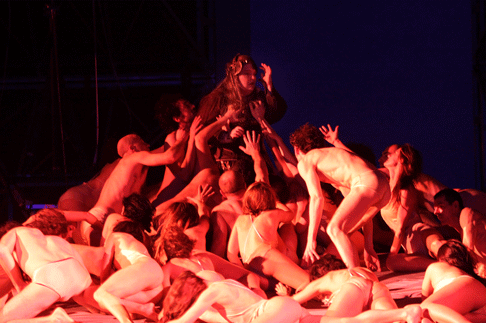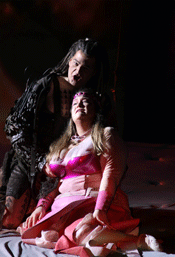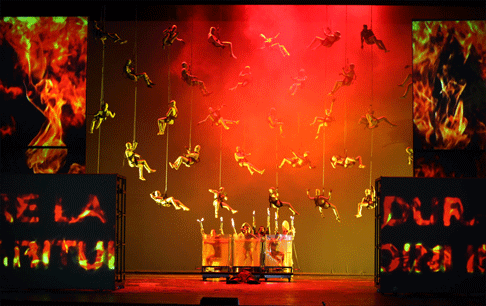After a performance lasting six hours (including two intermissions), Zubin and the full cast had a 15 minutes standing ovation by an audience packing every one of the 2.500 seats of the huge Teatro Comunale. Then, 250 lucky guests moved to a Gala Birthday Dinner in Palazzo Tornabuoni; we returned to our hotel at around 3 a.m. After a run in Florence until May 9th, the production will be seen in Valencia in June at the Palau de les Arts Reina SofÌa, where in July a full fledge *Ring Cycle* is scheduled. According to present plans, the full *Cycle* will be back in Florence in 2013, the bicentenary of Wagner’s birth, for the inauguration of the new Park of the Music now being built near the main Railway Station.
The Florence- Valencia *Gˆtterd‰mmerung* and the other parts of the *Cycle* (shown in June 2007 and in October 2008) have been greeted by the Italian press as “the very best Ring” of the first part of the XXI century. Before expressing such a strong opinion, I would want to see, at least, the two new productions of *Gˆtterd‰mmerung* completing the *Ring Cycle*s of Cologne-Venice (next June) and Aix-en-Provence – Salzburg (next July). No doubt, the Florence-Valencia *Ring* is a landmark not only for the interpretation of Wagner masterpiece but for the musical theatre as a whole. It is the end of bewilderment in a live musical theatre performance.
Three years ago when the project was presented, the whole idea seemed daring and a bit foolish: to entrust the production of the Ring to the Catalan avant-garde group La Fura dels Baus ; in its previous operating experience (e.g. Debussy’s *Le Marthyre de Saint Sebastien* ) La Fura has drastically cut the score and introduced fully naked mimes and rather explicit stage movements. It appears (but is could be a hearsay) that at the initial contact, La Fura expressed the intention to compact in two-three hour the nearly 15 hour score, horrifying Maestro Mehta who just in Florence had conducted in 1979-81 a memorable *Ring*. Gradually Carlus Pedrissa (the stage director) and La Fura developed an entirely new approach to the *Cycle*. This approach is in full bloom in *Gˆtterd‰mmerung*. There are not any socio-political undertones, but a delicate balance between science fiction and poetry. Science fiction is modern XXI century way to represent the myth: all possible special effects are employed (3D movie projections on ten screens , elaborate stage machinery, flying objects, suspended swimming pools for the Rhinemaiden, complex lightings, the audience participation in Siegfried’s funeral march). And the myth? It does not revolve around the end of capitalistic industrial world and the promise of a better new age, but it is based upon the final verses of “Siegfried’sTod”, the initial text of what three decades later, became the Ring. These verses were never put to music in *Gˆtterd‰mmerung* (indeed deleted from the final text – in nearly 30 year the young red hot revolutionary Richard Wagner had became a bourgeois himself); in short, they state that after the fall of the Gods, in a world without Lord, there will be only Love”. A lay pantheistic simple philosophy.

If the set and direction are the end of bewilderment, the reviewer is bewildered by the harmony between the stage, the pit and the voices. La Fura has been an earnest and successful effort to follow each and every note of the score.
As the triumph of love is the main theme of this *Gˆtterd‰mmerung*, love itself is being rhapsodized in all possible combinations: conjugal love in the “day break”, wild sex (nearly a rape with coitus interruptus) in Siegfried’s approach to a sensual , and sex starving Gutrune, a full orgy in Br¸nnhilde’s rock, teasing petting in the scene of Siegfried with the Rhinemaden , lust for unsatisfied love by G¸nther, Hagen and Alberich . Again as love is at the center of *Gˆtterd‰mmerung* as well as of the *Ring* , Mehta has a lyric approach to the score , quite different from that (very dramatic) of the Florence 1979-81 *Ring*. The Maggio Musicale Orchestra and Chorus responded in an excellent manner.
 Also, both Mehta and La Fura have, at their disposal, a better cast of singers and actors than that of the 1979-81 when Jean Cox as Siegfried was already way over bend. Lance Ryan is well known to the American and German audience, but he has seldom sung in Italy. Notably, he has never shown his athletic qualities. In this *Gˆtterd‰mmerung*, as soon as he is welcome to dinner in the Gibichung royal hall, the Canadian tenor, as any good red blooded but well mannered North American, takes off his dirty forest wilderness clothes to shower and put on a proper attire: his high “Cs” and legatos are beautiful under the shower and when , due to Hagen’s potion, tries to do it with Gutrune on the dinner table and in front of his hosts. He can even sing hanging by his feet in the confrontation with in Br¸nnhilde in the second act. And he can shoot an acute after another. Not a full heldentenor, but a very good tenor with a crystal clear timbre.
Also, both Mehta and La Fura have, at their disposal, a better cast of singers and actors than that of the 1979-81 when Jean Cox as Siegfried was already way over bend. Lance Ryan is well known to the American and German audience, but he has seldom sung in Italy. Notably, he has never shown his athletic qualities. In this *Gˆtterd‰mmerung*, as soon as he is welcome to dinner in the Gibichung royal hall, the Canadian tenor, as any good red blooded but well mannered North American, takes off his dirty forest wilderness clothes to shower and put on a proper attire: his high “Cs” and legatos are beautiful under the shower and when , due to Hagen’s potion, tries to do it with Gutrune on the dinner table and in front of his hosts. He can even sing hanging by his feet in the confrontation with in Br¸nnhilde in the second act. And he can shoot an acute after another. Not a full heldentenor, but a very good tenor with a crystal clear timbre.
Br¸nnhilde is another North American , Jennifer Wilson, recently applauded as Isolde in Los Angeles. She is as overweight as expected by a Walkyrie and, albeit very good with the high tonalities, she has some difficulties in descending to low pitched tones. She masters the role technically by molding the use of her voice to fully explode in the final holocaust scene.

The Ghichung Kingdom is a modern Metropolis for rather vulgar nouveaux riches. In the smoke stocks of a declining industrial society, a ticker – similar to those of Cnbc or any other all news TV financial channels – reports the stock exchange news. Gutrune is a sexy lyric soprano (Bernardette Flaitz), G¸nther a well round baritone (Stefan Stoll), Hagen a deep basso (Hans Peter Kˆning), Alberich a less deep basso bordering on a baritone voice (Franz-Joseph Kapellman). Of all the other singers, a special mention is needed for Catherine Wyn-Rogers (Waltraute), the only semi-Divinity in this very human *Gesmtkunswerk* (total theater) centered on love.
Giuseppe Pennisi
image=http://www.operatoday.com/139-6241.gif
image_description=
product=yes
product_title=Richard Wagner: Gˆtterd‰mmerung
product_by=Lance Ryan: Siegfried; Stefan Stoll: Gunther; Hans Peter Kˆnig: Hagen; Franz-Joseph Kapellmann: Alberich; Jennifer Wilson: Br¸nnhilde; Bernadette Flaitz: Gutrune; Catherine Wyn-Rogers: Waltraute; Daniela Denschlag: Die erste Norn: Pilar V·zquez: Die zweite Norn; Eugenia Bethencourt: Die dritte Norn; Silvia V·zquez: Woglinde; Ann-Katrin Naidu: Wellgunde; Marina Prudenskaya: Flosshilde;NicolÚ Ayroldi: Ein Mann; Fabio Bertella: Ein anderer Mann. Orchestra e Chorus of Maggio Musicale Fiorentino. Zubin Mehta: conductor. Carlus Padrissa: stage direction. La Fura dels Baus: stage production.